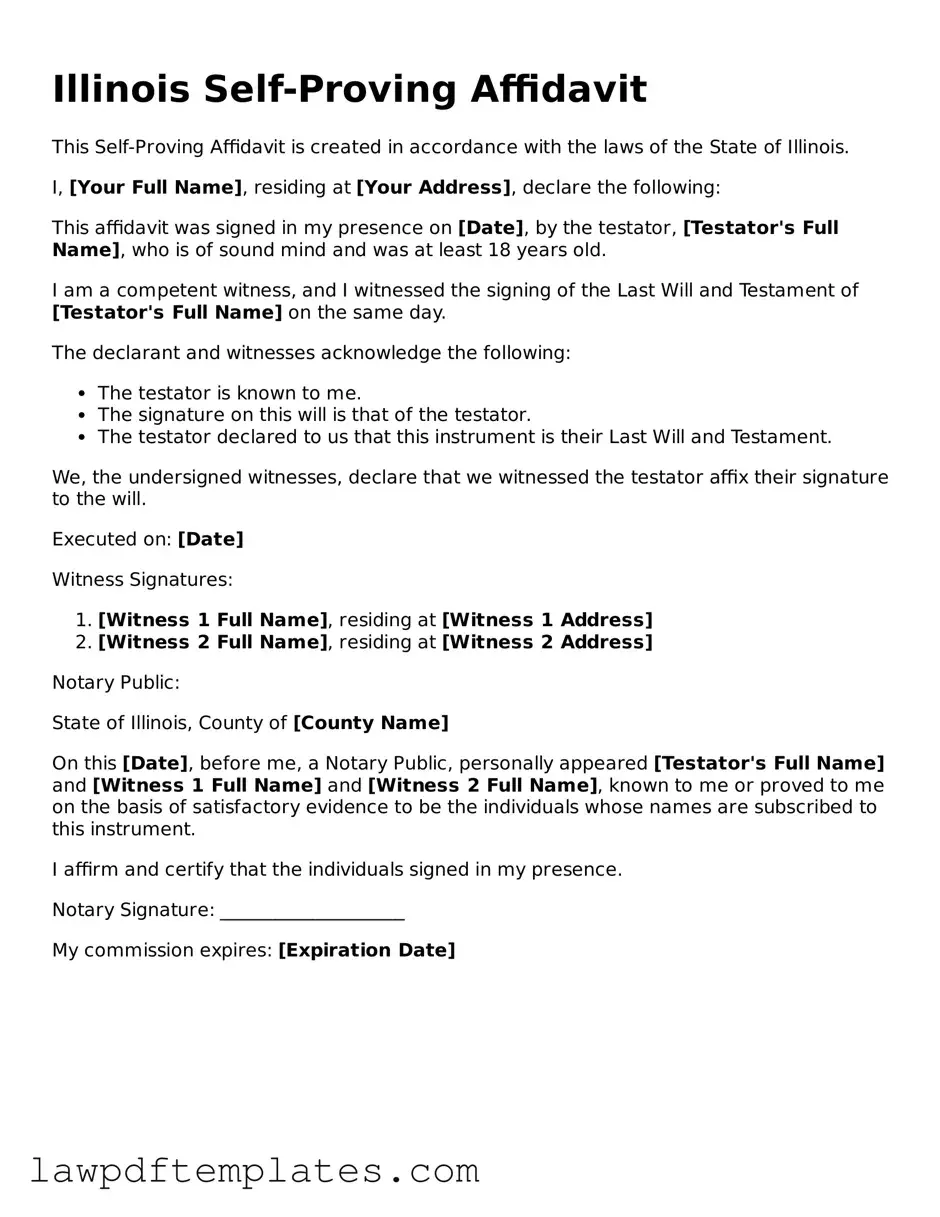Free Self-Proving Affidavit Template for the State of Illinois
Form Breakdown
| Fact Name | Description |
|---|---|
| Purpose | The Illinois Self-Proving Affidavit serves to simplify the probate process by allowing a will to be accepted without the need for witnesses to testify about its validity. |
| Governing Law | This form is governed by the Illinois Probate Act, specifically 755 ILCS 5/6-3. |
| Signature Requirements | The testator must sign the affidavit in the presence of a notary public and at least two witnesses. |
| Witnesses | Witnesses must also sign the affidavit, affirming that they witnessed the testator's signature and that the testator was of sound mind. |
| Notary Role | A notary public plays a crucial role by verifying the identities of the signers and administering the oath. |
| Validity | The affidavit remains valid as long as it is executed in accordance with Illinois law, ensuring its acceptance in probate proceedings. |
| Filing | While the affidavit itself does not need to be filed with the court immediately, it should be kept with the will for future reference. |
| Revocation | The self-proving affidavit can be revoked if the testator executes a new will or if a subsequent affidavit is created that supersedes the previous one. |
Sample - Illinois Self-Proving Affidavit Form
Illinois Self-Proving Affidavit
This Self-Proving Affidavit is created in accordance with the laws of the State of Illinois.
I, [Your Full Name], residing at [Your Address], declare the following:
This affidavit was signed in my presence on [Date], by the testator, [Testator's Full Name], who is of sound mind and was at least 18 years old.
I am a competent witness, and I witnessed the signing of the Last Will and Testament of [Testator's Full Name] on the same day.
The declarant and witnesses acknowledge the following:
- The testator is known to me.
- The signature on this will is that of the testator.
- The testator declared to us that this instrument is their Last Will and Testament.
We, the undersigned witnesses, declare that we witnessed the testator affix their signature to the will.
Executed on: [Date]
Witness Signatures:
- [Witness 1 Full Name], residing at [Witness 1 Address]
- [Witness 2 Full Name], residing at [Witness 2 Address]
Notary Public:
State of Illinois, County of [County Name]
On this [Date], before me, a Notary Public, personally appeared [Testator's Full Name] and [Witness 1 Full Name] and [Witness 2 Full Name], known to me or proved to me on the basis of satisfactory evidence to be the individuals whose names are subscribed to this instrument.
I affirm and certify that the individuals signed in my presence.
Notary Signature: ____________________
My commission expires: [Expiration Date]
Common mistakes
Filling out the Illinois Self-Proving Affidavit can be a straightforward process, but many people encounter common pitfalls that can lead to complications down the line. One frequent mistake is not having the document signed in the presence of a notary public. This step is crucial, as the affidavit must be notarized to be considered valid. Without this signature, the affidavit may not hold up in court.
Another error is failing to include the correct date. The date of signing is essential, as it establishes when the affidavit was executed. If the date is missing or incorrect, it can create confusion regarding the validity of the document. Moreover, some individuals overlook the importance of having all witnesses present during the signing. Illinois law requires that at least two witnesses sign the affidavit, and their absence can render the document invalid.
In addition, people sometimes forget to provide their full names and addresses. This information is vital for identification purposes and helps avoid any potential disputes about the validity of the affidavit. Similarly, using unclear or ambiguous language can lead to misunderstandings. It is important to be precise and clear when stating the intentions behind the affidavit.
Another common mistake is not reviewing the completed form before submission. Errors can easily go unnoticed, and a simple typo could have significant implications. It is advisable to take the time to double-check all information to ensure accuracy. Additionally, individuals may neglect to keep copies of the signed affidavit for their records. Having a copy can be invaluable for future reference or if any questions arise regarding the document.
Some people also misunderstand the purpose of the affidavit. It is not merely a formality; it serves to affirm the validity of a will in the event of a dispute. Misconceptions about its importance can lead to inadequate preparation. Lastly, individuals may not seek legal advice when necessary. Consulting with a legal professional can help clarify any doubts and ensure that the affidavit is completed correctly.
Discover More Self-Proving Affidavit Templates for Specific States
Self Proving Affidavit Georgia - A completed Self-Proving Affidavit can expedite the probate process significantly.
Ensuring a smooth transaction when buying or selling an RV in Texas is important, and using the Texas RV Bill of Sale can help facilitate this process. By providing clear documentation, both parties can avoid potential disputes and misunderstandings. For your convenience, you can find the necessary forms and additional resources at PDF Documents Hub.
How to Make Affidavit - A Self-Proving Affidavit is a valuable tool for anyone concerned about their estate’s future.
How to Write a Will in Massachusetts - The affidavit is signed by the testator and witnesses under oath.
Free Florida Affidavit Template - Filing a Self-Proving Affidavit may expedite the probate process significantly.
